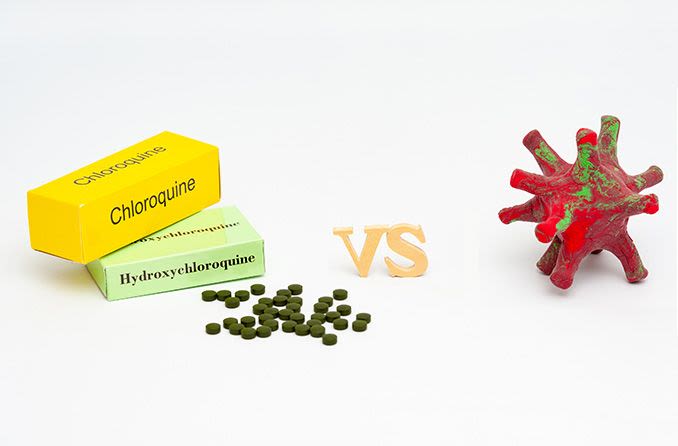As a COVID-19 treatment, hydroxychloroquine may damage your eyes

Hydroxychloroquine (HCQ) and your eyes
A drug that has stirred controversy as a treatment for coronavirus patients has also raised concerns about its effect on vision.
The drug, hydroxychloroquine, along with its counterpart chloroquine, can lead to retina damage in a small percentage of patients.
Long-term vs. short-term hydroxychloroquine use
Hydroxychloroquine and chloroquine present a small risk of retinal damage when used over a long period of time.
One study found some level of retinal damage in:
About 1% of patients who take hydroxychloroquine for five years
Less than 2% of patients who take hydroxychloroquine for 10 years
About 20% of patients who take hydroxychloroquine for 20 years
While COVID-19 patients are usually treated with a higher dosage of hydroxychloroquine or chloroquine, they often only take the medication for a short period of time — about one to two weeks in many cases.
It’s not yet known how this short-term, high-dose regimen will affect the eyes.
For the time being, patients should weigh the vision risks against the benefits of taking the controversial drug, according to the Asia-Pacific Journal of Ophthalmology.
A medical history of a patient’s previous or current eye diseases should be considered before treatment, the authors advise.
SEE RELATED: How COVID-19 affects your eyes
Retinal risk factors and symptoms
Hydroxychloroquine and chloroquine can, in some instances, lead to retinopathy — damage along the thin layer inside the eye that receives light signals.
Two of the key factors associated with retinopathy risk are:
Medication dosage taken each day
How long someone has been taking the medication
Yearly eye exams tend to be recommended for people who take hydroxychloroquine or chloroquine, especially over long periods of time. Once-per-year screenings can diagnose and prevent the progression of eye conditions triggered by one of these drugs.
Retinopathy caused by hydroxychloroquine or chloroquine can include the following symptoms:
Difficulty reading
Limited nighttime vision
Loss of colour vision
Intended use of hydroxychloroquine and its effect on COVID-19
Aside from treating autoimmune diseases such as lupus and rheumatoid arthritis, these two drugs can also be prescribed to prevent and treat malaria, the mosquito-borne disease commonly seen in parts of Africa and Asia.
But there is little to no scientific evidence that hydroxychloroquine or chloroquine can reduce illness, hospitalisation or death rates related to COVID-19, according to the World Health Organization (WHO).
The WHO conducted a trial of thousands of patients to find out how different medications affected the outcome of COVID-19 infections.
In June 2020, the organization removed hydroxychloroquine from the trial, since “evidence showed it did not result in the reduction of mortality of hospitalised COVID-19 patients, when compared with standard care.”
HCQ use in India
In May 2020, the Indian central government expanded the use of hydroxychloroquine, according to a Hindustan Times report.
But the drug’s largest purpose wasn’t to treat the sick. Instead it was mainly used as a prophylactic — a way to prevent people from getting sick in the first place.
It was mostly directed toward health care workers exposed to COVID-19 patients.
As of February 2021, Quartz India reported that the country has distributed more than 111 million doses of hydroxychloroquine.
READ MORE: Will a COVID-19 vaccine affect your vision?
Macular toxicity after short-term hydroxychloroquine therapy. Indian Journal of Ophthalmology. February 2019.
Chloroquine and Hydroxychloroquine Retinal Toxicity Consideration in the Treatment of COVID-19. Asia-Pacific Journal of Ophthalmology. March 2020.
Coronavirus disease (COVID-19) advice for the public: Mythbusters. World Health Organization. March 2021.
Coronavirus disease (COVID-19): Solidarity Trial and hydroxychloroquine. World Health Organization. June 2020.
India expands use of controversial drug for coronavirus despite safety concerns. Nature. June 2020.
Page published on Friday, 21 May, 2021





